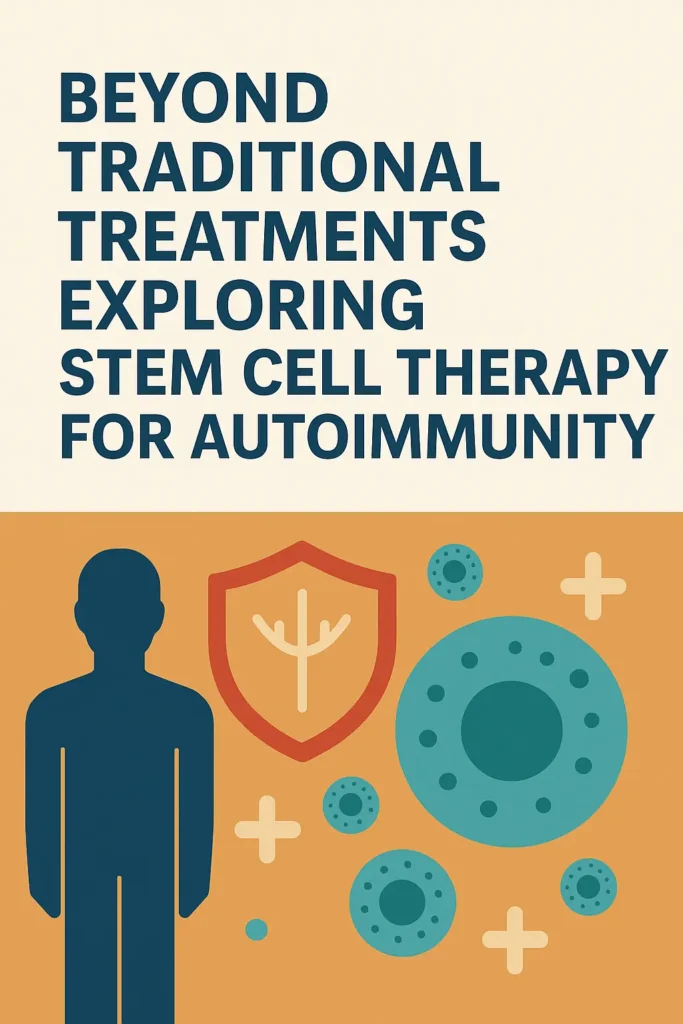Alternative Autoimmune Treatment Stem Cells: A New Path Beyond Traditional Therapies
If you’re living with an autoimmune disease and feel like conventional medications are no longer enough, you’re not alone. Many patients are now exploring alternative autoimmune treatment stem cells an exciting frontier in modern medicine that goes beyond suppressing symptoms to potentially regenerating immune function itself.
In this article, we’ll explore how stem cell therapy compares to traditional treatments like immunosuppressants, discuss advanced treatments for autoimmune disorders, and highlight where this innovation fits in the growing landscape of alternative autoimmune therapies.
Why Traditional Treatments May Fall Short
Most conventional treatments for autoimmune diseases rely on immunosuppressants drugs that dampen the immune system’s overactivity. While these medications often reduce symptoms, they can come with significant downsides:
- Increased risk of infections
- Long-term side effects (bone loss, liver damage, etc.)
- Lifelong dependency
- No actual repair or regeneration
For many, the goal isn’t just to suppress the disease it’s to find real, lasting improvement. That’s where stem cell therapy may offer something different.
Stem Cell Therapy vs Immunosuppressants: What’s the Difference?
Stem cell therapy isn’t about shutting the immune system down it’s about retraining it. When comparing stem cell therapy vs immunosuppressants, the distinction becomes clear:
| Aspect | Immunosuppressants | Stem Cell Therapy |
|---|---|---|
| Goal | Suppress immune response | Reset/rebuild immune function |
| Approach | Drug-based, ongoing | Regenerative, one-time or short-term |
| Side Effects | Common, long-term risks | Risky but potentially curative |
| Accessibility | Widely available | Limited, often in clinical trials |
| Personalization | Low | High (often patient-specific cells) |
While immunosuppressants are essential for many, patients who haven’t seen success or want something more are now turning toward alternative autoimmune treatment stem cells.
How Stem Cells Work in Autoimmune Diseases
Stem cells are like the body’s raw repair tools. They can differentiate into specialized cells and promote tissue repair, immune balance, and anti-inflammatory responses.
In autoimmune diseases, this could mean:
- Reducing chronic inflammation
- Reprogramming immune cells to reduce autoimmunity
- Repairing damaged organs and tissues
This is why stem cells are a cornerstone of innovative autoimmune therapies that move beyond symptom control and into the realm of regeneration.
Advanced Treatments for Autoimmune Disorders: The Role of Stem Cells
Let’s take a closer look at advanced treatments for autoimmune disorders involving stem cells:
1. Mesenchymal Stem Cells (MSCs)
These are known for their anti-inflammatory and immune-regulating properties. Used in trials for lupus, Crohn’s, and rheumatoid arthritis.
2. Hematopoietic Stem Cell Transplant (HSCT)
Used more aggressively in conditions like multiple sclerosis, HSCT involves rebooting the immune system with a full transplant.
3. Adipose-Derived Stem Cells
Harvested from fat tissue, these are being explored for their accessibility and regenerative benefits.
Many of these approaches are still considered innovative autoimmune therapies, but clinical trials and anecdotal reports show growing momentum.
Is Stem Cell Therapy Right for You?
If you’re considering an alternative autoimmune treatment with stem cells, ask yourself:
- Have you tried multiple medications with limited success?
- Are your symptoms still significantly affecting your quality of life?
- Are you open to experimental or advanced therapies?
- Can you access clinical trials or certified treatment centers?
Stem cell therapy isn’t a guaranteed cure but for some, it has led to significant remission, reduced symptoms, and better long-term outcomes.
Considerations, Risks & Access
Before making any decision, it’s crucial to understand both the promise and the limits:
- Costs: Often not covered by insurance
- Regulatory Status: Not fully approved in many countries for autoimmune use
- Risks: Especially with aggressive therapies like HSCT
- Clinical Trial Requirement: Access is still limited to research settings or specialized centers
Still, if you’ve exhausted conventional treatments, exploring stem cell therapy as an alternative autoimmune treatment may offer the possibility of a breakthrough.
Conclusion: Hope Through Innovation
Alternative autoimmune treatment stem cells are ushering in a new era of hope for those who haven’t found relief through traditional means. From reprogramming immune responses to regenerating damaged tissue, the potential of these therapies is both real and revolutionary.
If you’re seeking more than symptom suppression if you’re searching for a deeper solution stem cell therapy might be the next path to explore.
Stay informed. Ask questions. Your journey to healing may just be beginning.





